The hot-button topic film The Babysitters was a low-budgeted
labor of love. Written and directed by David Ross, it starts as a
star-crossed infatuation story that spirals wildly out of control. A
teen babysitter who has a crush on one of her clients somehow ends up a
hardened high-school madame.
The movie stars John Leguizamo as Michael, a bored suburban husband who
hates his job and has become bored with his wife Gail (played by Cynthia
Nixon of Sex and the City). Suddenly he notices that his young
babysitter Shirley has a crush on him and when a kiss gets a little out
of hand he gives her a particularly big tip. When his friends find out
what happened, they want a babysitter of their own, so Shirley gets some
of her friends to join up. What starts as a simple way of making some
college movie suddenly loses control and touches on greed, violence and
drug use.
Leguizamo, who has built up a respected career in Hollywood by making
such thought-provoking films as Moulin Rouge, Carlito’s Way, Summer of Sam
and To Wong Foo, Thanks for Everything, Julie Newmar – was so
impressed by the script that he became one of the producers to make sure
the project came to fruition.
The role of Shirley is the movie starring debut of beautiful young stage
actress Katherine Waterston, who had turned heads in the play Los
Angeles. Waterston grew up around filming – her father Sam has done
many movies such as The Killing Fields and has spent the last
several years as DA Jack McCoy on the TV series Law and Order.
Stars John Leguizamo and Katherine Waterston and writer/director David
Ross sat down with us at the Regency Hotel in New York a few days before
the film’s
opening to tell us about making The Babysitters.
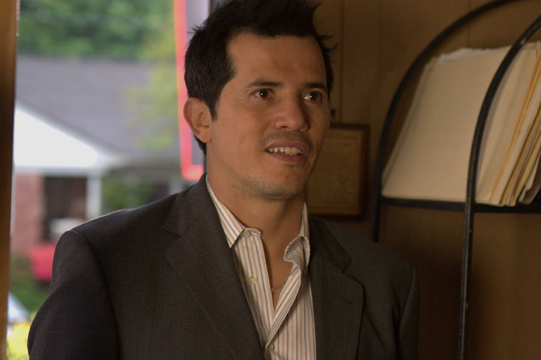 So,
John, how many more movies are you going to be in [this year]?
So,
John, how many more movies are you going to be in [this year]?
John Leguizamo:
Is that a complaint? (laughs) Because if it is, I won’t tell
you.
No, we just have to
anticipate the schedule… In all seriousness, this seems to be like your
year.
John Leguizamo:
Let’s hope
it is. I’ve just got a few more.
So how different was
each one?
John Leguizamo:
Do you
want to come to the next junket, or are you trying to cheat? (laughs)
I smell a rat. Let’s talk about this one, and then when I see you at
The Happening one…
What was there about
this role that intrigued you?
John Leguizamo:
I thought
it was a great script. (motions to David Ross) He’s the writer
and director of the piece, so… Not that I wouldn’t say it behind your
back, anyway. (laughs) But I thought it was a great, great piece.
I loved the way he was playing with morality issues. I think we live in
a really strangely weird time, when morality is very questionable.
People don’t know how to really behave and what’s right and what’s
wrong. There don’t seem to be consequences for things. With this
administration, it seems like everybody can be lawless and get away with
as much as they can. It’s all right.
Well, this is coming
out not that long after the Elliot Spitzer controversy.
John Leguizamo:
There are
real consequences there.
Exactly. Why do you
think men will put their lives, their livelihoods and their families in
danger for such an illicit thrill?
John Leguizamo:
Well, a
lot of people don’t think they’re going to get caught, don’t they?
There’s a little bit of that: “It’s not going to be me.” But in this
movie, what I liked about it was David didn’t wrap it up. He didn’t say,
“This is what the code is. This is why you have to behave.” But there
were consequences to everybody’s actions. What I liked about it was in
the end it wasn’t the usual consequences. People didn’t go to jail. She
didn’t go to jail. I wasn’t arrested. They had to live with themselves.
They had to live with it, knowing that you damaged and hurt people.
David Ross:
We made a very conscious choice that in the end, the consequences of
having to live with yourself could be so much worse. We wanted to say
that there are worse things than just getting caught. Maybe you should
behave yourself. Maybe you should live well – or at least live the best
you can. However that may be. Because, it’s the right thing to do, as
opposed to you’re afraid of getting caught. We don’t
want to preach and say, “This is the way to live. Anybody who doesn’t
live up to certain standards is evil.” At the same time, I think it is
important to at least try and really think about the choices you make
and why you make them.
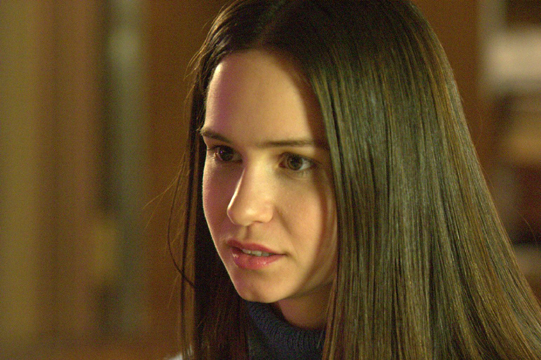 As
you conceive of your characters, where are they at five years after the
movie ends?
As
you conceive of your characters, where are they at five years after the
movie ends?
Katherine Waterston:
Something I love about the ending is that you do of course sense that
there are consequences for these characters, but you don’t get to
experience them. I talk a lot about something in Woody Allen movies,
like [Crimes and Misdemeanors]… (chuckles) this is weird
for me to reference because my dad’s in it, but you often in his films
watch the character suffering through their guilt. You experience that
punishment with them. In this film, you are left to wonder. You are left
to wonder what will happen to them and how damaging or not damaging this
will be with time. I like [that] it’s sort of left to you to decide how
you feel this will effect them. I love that about it. I don’t really
feel like I have an answer for what that will be for her. I love that
it’s hopeful – that there is the possibility that you can get through
damaging things and come out the other end. There is a sense of hope, I
think. Certainly, this is a mark on her that I can’t imagine could ever
really go away. It’s her introduction to sexuality, and it’s not a
terribly positive one I don’t think. (chuckles again) So, I think
it’s complicated.
You have quite an arc
involved, you go up and down through a variety of changes – your
reticence to get into the thing, then you get into it, then you have to
fight it off. Can you talk about how you worked it out in your own head?
Katherine Waterston:
I think that there were a couple of really simple things that I was able
to follow throughout that kept me kind of grounded, despite what was
going on at any moment: my love for this man and my need for control.
Then I also felt like the thing that I tapped into from my personal
experience of growing up was the… I’m going to be a broken record for
John if I keep saying this… but the dichotomy at that age
between
being
innocent and also mature. Those things living together in one person.
Rather than one and then something happens and you become the other. You
don’t graduate into adulthood overnight. It just happens in movies all
the time and it’s bullshit. In this film, I thought something so smart
about the script is that she’s constantly wavering. It gave me a lot of
permission to not judge myself if in a moment I was feeling vulnerable,
or scared, or confused. Not judge myself within the moment. I felt I
could have authority and be confident and a woman. I felt like it gave
me a lot of freedom, in a way to live in the moment as long as I was
sure to be loving him and trying to control this out of control
feeling.
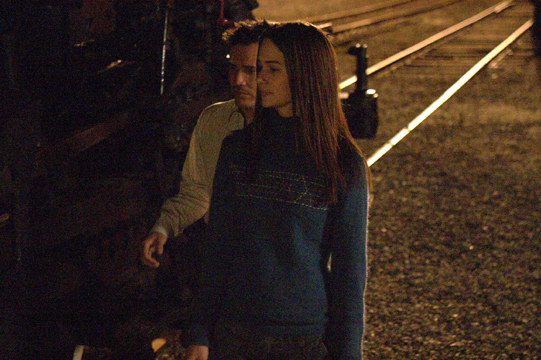 Did
you see it as a sort of role reversal? She is the child at first and at
the end he sort of is...
Did
you see it as a sort of role reversal? She is the child at first and at
the end he sort of is...
John Leguizamo:
Right.
Right. Then she becomes the parent.
Did you guys talk
about it to work that out?
Katherine Waterston:
Yeah…
John Leguizamo:
I mean
David, to his credit, had a lot of rehearsals prior to shooting. It
really mapped out a lot of arcs of the characters. As [well] we talked
endlessly about the sex scenes, just because that’s the type of guys we
are, but…
Katherine Waterston:
I’m a man, by the way… I don’t know if you guys got that memo.
John Leguizamo:
She’s a
tough one.
David Ross:
Made me cry like a baby.
Katherine Waterston:
Every day. Off camera.
John Leguizamo:
But we
really wanted to map out these arcs, man, in that we really wanted them
to really be in love. And the stakes are really high. He loves his wife.
He loves his kids. But he falls in love and he’s got this middle-aged
crisis, which we can all understand. It’s not that simplistic.
Katherine Waterston:
(smiles) I can’t…
John Leguizamo:
Oh, you
can’t?
Katherine Waterston:
We can’t all [understand a mid-life crisis]...
John Leguizamo:
(laughs)
We can’t all, but you will.
You will have your
day!
John Leguizamo:
Exactly.
Don’t laugh too hard, now.
Katherine Waterston:
If I make it.
John Leguizamo:
I didn’t
want to be in scenes that were exploitive and just gratuitous. Not that
he would do that, anyway. But I didn’t want it to distract from the
story. I thought the story was so powerful. I didn’t want it to be
trivialized by it. So we made sure that when we did the sex scenes, it
was in the audience’s mind more than what we were doing. So the
perversion was in your head.
Katherine Waterston:
(laughs) Hey, it’s not us! You perverts!
John Leguizamo:
Which I
thought made it more funny and clever that way. The only time that she
is completely disrobed…
Katherine Waterston:
Well,
let’s not start… (laughs)
John Leguizamo:
… well,
halfway… is at the end, when it’s not a sexual situation. It’s more of a
getting out of it. They are trying to connect. Maybe this is the only
thing they really had. It wasn’t love.
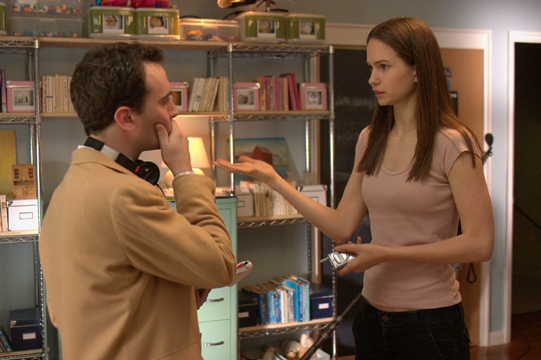 David
Ross: Pure
vulnerability at that point. Yeah, we said from the beginning that every
sex scene that’s in there – especially the ones between Michael (Leguizamo’s
character) and Shirley (Waterston’s character) are there for a reason
other than just showing sex. There’s something different happening
between their characters each time, you know? The tone of each one is
just a little bit different, too. The first time, they get together
because it’s kind of Shirley and Michael’s first… you know, they’re in
their little fantasy world where they go to the trains and they make out
– so we have music and the camera is very fluid. Of course, when Shirley
actually loses her virginity in the second scene, it’s almost the
opposite of what everybody imagines their first experience to be like.
There is no music. It’s just kind of hand-held. We always said that the
sex scenes are going to be pretty much right up here (gestures to his
face) in close-up. And I’m not a big close-up guy. I feel like you
have to really save those and they are always just the right moment,
because their faces are so close to each other, but at the same time,
there is so much that they are not saying. They’re trying to express it
through the sex, but…
David
Ross: Pure
vulnerability at that point. Yeah, we said from the beginning that every
sex scene that’s in there – especially the ones between Michael (Leguizamo’s
character) and Shirley (Waterston’s character) are there for a reason
other than just showing sex. There’s something different happening
between their characters each time, you know? The tone of each one is
just a little bit different, too. The first time, they get together
because it’s kind of Shirley and Michael’s first… you know, they’re in
their little fantasy world where they go to the trains and they make out
– so we have music and the camera is very fluid. Of course, when Shirley
actually loses her virginity in the second scene, it’s almost the
opposite of what everybody imagines their first experience to be like.
There is no music. It’s just kind of hand-held. We always said that the
sex scenes are going to be pretty much right up here (gestures to his
face) in close-up. And I’m not a big close-up guy. I feel like you
have to really save those and they are always just the right moment,
because their faces are so close to each other, but at the same time,
there is so much that they are not saying. They’re trying to express it
through the sex, but…
John Leguizamo:
Well, how
brilliant is that, that you chose to do the sex scenes in close-ups, you
know what I mean? Everybody else is trying to do every emotion in a
close-up. You’re doing the sex scene in a close-up. I think that’s
pretty incredible.
David Ross:
Thanks. (They both laugh.)
John Leguizamo:
I do, I
feel it’s pretty incredible.
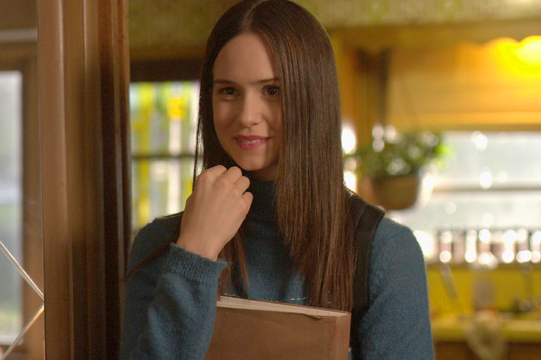 Did
you feel that you really had a handle on your power over them by the end
of the film?
Did
you feel that you really had a handle on your power over them by the end
of the film?
Katherine Waterston:
Well, I don’t know about power. I think that perhaps that was more of an
outcome of something that she tried to do. Tried to be powerful. Tried
to control these out-of-control feelings, essentially. I feel like up
until she falls in love with Michael she is able to control everything
in her life. If something is uncomfortable, she can organize it. She can
make it function. Then these emotions come along and happen to her that
she can’t control, but it’s all she knows. What I thought about her, all
she knew was to organize and control things, so everything was born out
of that. Even when she’s trying to be powerful, to control these girls,
I don’t think that it was ever about being powerful for her. That was
just some sort of desperate tool she pulled out of some hat to try to
deal with these things she wasn’t able to talk about with anybody. With
him or anyone else… I think that she does sort of let go of that
obsession with control by the end. That’s sort of the way the OCD aspect
kind of rides on parallel to this coming of age thing. This is something
that in a way has to do with her innocence, her control. Of course you
can control things when everything is very simple. When you understand
the world is bigger and more complicated, you realize you can’t really
control everything.
You had mentioned
earlier the fact that your father is an actor as well. Did growing up
around it make you want to be an actor from childhood?
Katherine Waterston:
Yeah. (laughs) I don’t remember not wanting to do it. But, I was
a really obnoxious kid and I guess I went through a phase where I didn’t
want to be like anyone else in my family. Who doesn’t, you know? So I
kind of kept it a secret for a long time. But I wanted to do it.
I’m going to law
school!
Katherine Waterston:
Yeah, I was such a rebel. I mean I was a photography student. That’s the
way that I rebelled. I really went so far away. So, I don’t know.
As a child I don’t know if I wanted to do it because I knew there were
other options or because at such an early age I thought that was what
grown-ups did. But it goes that far back. I can’t remember wanting to do
anything else. Except, I was talking about this today, I think I
remember at one point I did want to be a back-up singer for Bob Marley.
That may have been
hard…
Katherine Waterston:
Yes, in many ways at that time. He had passed away and I was white and
from Connecticut. My mother had to break it down for me. (laughs)
They’re making a
movie of his life. Maybe this is your chance.
Katherine Waterston:
I could play Rita. (laughs again)
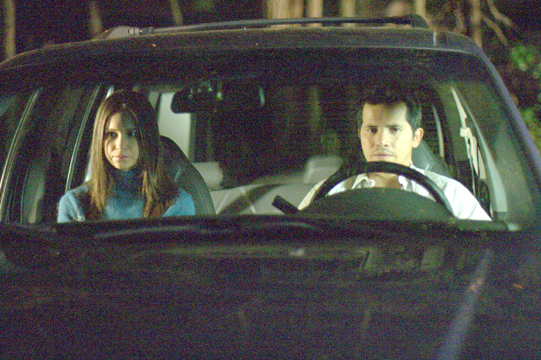 The
difference between your two characters I thought was that Shirley was so
fearful about being out of control and then she has this experience and
she does go out of control. I was worried at the end that it was
possible that Shirley was going to go right back to “See, that’s what
happens if you let go of control.” With Michael, I wasn’t sure where
Michael is going to go with this experience. If he’s going to go for the
next twenty years…
The
difference between your two characters I thought was that Shirley was so
fearful about being out of control and then she has this experience and
she does go out of control. I was worried at the end that it was
possible that Shirley was going to go right back to “See, that’s what
happens if you let go of control.” With Michael, I wasn’t sure where
Michael is going to go with this experience. If he’s going to go for the
next twenty years…
John Leguizamo:
Or if he’s
going to go for the next babysitter?
You’re not sure with
Michael. In the short term he’s going to go back to family. But after
that, I don’t know how you saw Michael down the road. He’s been
chastened for now, but he’s also known a different kind of love.
David Ross:
Once he’s sort of broken that seal.
John Leguizamo:
It seems to me that the problems that Michael has in his marriage – I
think it might not have been true. It might have been somebody his age,
you know… I think they have marital problems. Eventually, maybe that
will undo the relationship. It’s like any couples you know – you think
they’re together, you think they love each other. Next thing you know,
they’re getting divorced. Like, holy shit! Others you saw coming. But
you don’t know what’s going to happen. People change. His problems are –
he’s kind of in a rut. Emotionally, psychologically, sexually. He’s in a
rut.
David Ross:
Work-wise.
John Leguizamo:
Yeah, the whole thing. What do you do to get out of that?
Katherine, what
attracted you to the role?
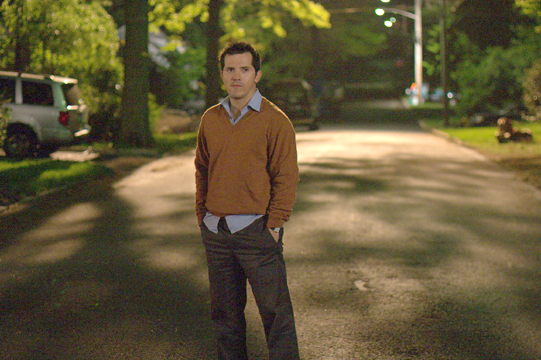 Katherine
Waterston:
John Leguizamo. (laughs)
Katherine
Waterston:
John Leguizamo. (laughs)
John Leguizamo:
I was going to say that, but it would have been brazen, I think.
And we love that.
We’re sucking up to him, too. But, I’m curious what you looked at to
want to do this role – especially this is a big, leading role…
Katherine Waterston:
Well, that’s always nice. That is appealing. David talks about
wanting to make films where good people make bad choices. I think that’s
really always fun for actors. Always. Then, I think in terms of
roles for young women, she’s a really rich character. Really full and
really complicated. The answers aren’t just spoon-fed to you about her.
I had to go kind of digging for some of it and that’s so much fun. I
feel like if I had a lot more options… this was definitely a big break
for me, so it was not like I was saying, shall I do this film or this
film or this film? It was a great, great gift. (To David) Thanks,
by the way… (Back to us) But I think if I had more options, I
still would have really wanted to play this part, because you just never
see anything like this. Usually I’m seeing the parts more like not on my
coffee table as options, but in the theater.
How did you find her?
David Ross:
There was a friend of… (to Katherine) You keep telling this story
and I keep getting it wrong…
Katherine Waterston:
I did a reading of a screenplay in New York.
John Leguizamo:
But not this one, a different one.
Katherine Waterston:
A different one, at RS Nova. We ultimately used the rehearsal space for
this movie. But I did a reading for Amy D’Addario. She’s a screenwriter.
She had a meeting later with the producers and she mentioned me. They
were working on this. I had dinner with them and they were just awesome.
I had read the script and talked about it, and they recommended me to
David. We had breakfast. It was all over meals. It was so civilized.
David Ross:
I was talking to Cora Olson, one of our producers, on the phone. Cora
was there at the very beginning. She worked for another company and she
was trying to get them to make the film. So they, her and Jennifer Dubin
and Jason Dubin, all called me and said we think we could probably raise
the money. We were in the process of trying to get everything going,
developing the script a little bit more. Cora said, “You know, we’re
meeting this girl, Katherine Waterston. We’ve heard really great things.
We’ll let you know how it is.” She called me right afterwards and said,
“We’re setting up the meeting with her. You have to meet her.” It was a
very easy decision after that. Katherine has the right balance of
intelligence and fieriness underneath that Shirley needs. Shirley,
despite being the lead, doesn’t have a lot of lines. It’s not like she
ever comes out and says, “This is how I feel…”
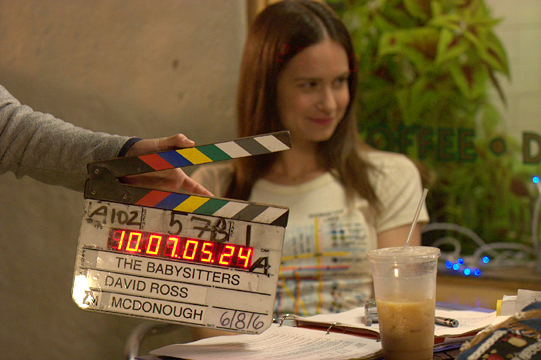 Even
a lot of the lines she does have, we ended up cutting because you just
didn’t need it. So much of it was right there in Katherine’s eyes. The
thing that John brings to the character of Michael, who also doesn’t
come right out and say how he feels until it’s way too late, is that
John has this incredible energy underneath. So, you put him in the suit
and tuck in his shirt and have him sit… You see that there’s something
underneath – this amazing energy that he needs to get out. That’s
Michael. It’s this is still who I am. I still have to express myself. I
have to get out and do something. It’s fun when you put two
personalities like that together, to watch the way they feed off one
another.
Even
a lot of the lines she does have, we ended up cutting because you just
didn’t need it. So much of it was right there in Katherine’s eyes. The
thing that John brings to the character of Michael, who also doesn’t
come right out and say how he feels until it’s way too late, is that
John has this incredible energy underneath. So, you put him in the suit
and tuck in his shirt and have him sit… You see that there’s something
underneath – this amazing energy that he needs to get out. That’s
Michael. It’s this is still who I am. I still have to express myself. I
have to get out and do something. It’s fun when you put two
personalities like that together, to watch the way they feed off one
another.
When writing the
screenplay, did you study current high school life?
David Ross:
I did, a bit. The
very first thing I did actually was I went back to Michigan and in my
mom’s basement I went digging around and I found all the stuff that I
wrote when I was around fifteen or sixteen. All the early short stories.
Some of the worst poetry you’ve ever seen in your life. And at the same
time did the old driving tour of the old hangouts. All these strange
places my friends and I used to go. The train graveyard in the film is
based on a real place that I visited on my seventeenth birthday. I did
things like that to get myself in the mindset. You just want to get
through that first draft, just want to get it out there. Make sure
you’re hitting all the right beats. Make sure you’re pretty much
figuring out the story. Then I just started re-writing and re-writing. I
was in school at the time – at the American Film Institute – which was
great, because I had these wonderful writing classes. About nine people.
And it was the same people for two years. So by the end, everybody knows
everyone else’s bullshit. No one is going to let you get away with
anything. They were pretty tough on me for the first draft, which was
fantastic, because it kept me honest. The more notes I would get, and
especially getting female input, was enormous. Beginning there, then
from my producers, and then all together from Katherine and John and
from the other members of the cast.
Katherine Waterston:
Female.
John Leguizamo:
I tried to
give as much female input I could… (laughs)
Katherine Waterston:
Well, he’s a New Yorker.
There was one scene
that was really good. Michael and his wife (Cynthia Nixon) are having
dinner with the boss and she makes a wrist-slitting gesture while
listening to him drone on. That was where I saw how they got together.
How did it come about?
John Leguizamo:
Yes. You got it. (claps)
Katherine Waterston:
Yay!
David Ross:
It was John’s
idea. (Katherine laughs) We were doing rehearsals and we were
talking. It might have even been in an email. He said, “You know what?
Can there be a scene where Michael and Gail have a great time together,
so we can understand all of that.” They are together for a reason. When
we first see them in the beginning, they’re having a small argument. We
didn’t want that to be too nasty. We never wanted this to be about… you
know people swearing at each other and calling each other names and
throwing stuff around the house. You’ll say, well it’s a terrible
marriage. It should end. As opposed to, this is mostly working, but at
what point do you say this will never work again? Get out. So, that
scene was very important for that reason. Also, because it just makes it
that much harder for him. Things are starting to really go downhill.
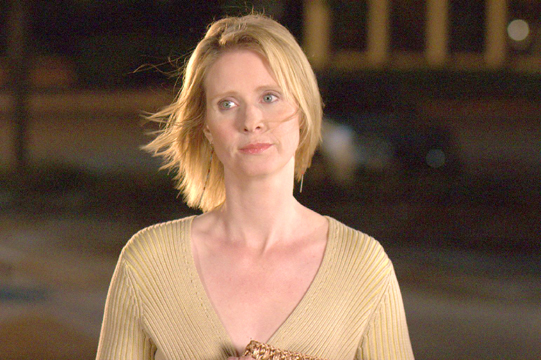 John
Leguizamo:
It can’t be that
easy.
John
Leguizamo:
It can’t be that
easy.
David Ross:
Cynthia brought a lot of that stuff, too.
John Leguizamo:
It could have easily gone to exactly what he’s saying – the yelling,
over-dramatics, some actors trying to show off all their range. It would
have wrecked the whole thing. She’s so contained. She chooses her
moments so well. Brings humor.
David Ross:
She’s so easy and
funny.
John Leguizamo:
But we did need somebody who… we needed Michael’s obstacles to be really
strong. It couldn’t be that he was pushed to that girl. It had to be a
moral dilemma. Somebody he loves, betraying them. Actually falling in
love. Messing her up by paying her and not being able to communicate.
He’s fucked up that way.
He did that because
it’s a way to distance himself from it.
John Leguizamo:
Of course. This guy – he’s got a lot of problems, man. This guy is
fucked up. She’s kind of fucked up. That’s what brings people together.
Two fucked up people.
Katherine Waterston:
It’s collusion, you know. We got in that together and we said, yeah,
let’s make all the wrong turns. I think there are some moments where
we’re like, yeah, let’s do that. It’s so stupid. And then, there are the
moments where you’re like, “Wait, I’m going through that.”
Did it remind you a
lot about high school and what high school was like for you?
Katherine Waterston:
Absolutely.
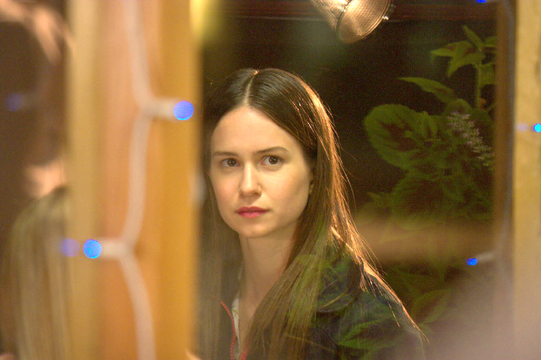 Was
it that screwed up?
Was
it that screwed up?
Katherine Waterston:
(laughs) Hopefully not. I mean I am an actor, so obviously there
was some damage done. (laughs again) Well, I mean, it was
complicated. That’s why I love this character. It wasn’t one thing. It
was bad choices and good choices and being vague intentionally. I feel I
made it to that thing, looking back on those years for me, and thinking:
wow, I thought I was being an adult in that situation and I was being a
stupid kid. But it felt like what a stupid kid thinks adult behavior is.
This performance of adulthood – trying it on for size. I don’t really
think that some of the typically dumbest teenage things that you could
do, like even parties and doing as many keg stands as possible is in a
weird way saying, “I am making my own choices. I’m an adult. I’m free to
decide what I want to do.” People often think, God, this is childish
behavior, but I don’t think people often think consider that these
teenagers aren’t trying to be kids. They’re trying to be adults. Prove
it to themselves. Prove it to each other. Prove it to their parents. And
I did that sort of thing. Not really keg stands… Not very ladylike.
Do you think you
could have written this movie without the help from classes and input
from cast and crew?
David Ross:
Yeah, I think that any time you’re writing something, you need some kind
of feedback. You need some kind of support system. Sometimes it’s just
the smallest things you’re missing that you take for granted. Like, I
mentioned the first draft, there was so much that I knew about Shirley.
I knew what she was going through. I figured it was getting across and
there were some very important things that weren’t coming across. So,
the first draft was just about a girl who goes and has sex for money for
no apparent reason. Anytime you do anything creative, especially if it’s
for an audience, I think it’s important to at least workshop your idea
along the way. That doesn’t mean you have to take every single note you
are given. That doesn’t mean you can try to please everybody.
John Leguizamo:
It’s hard. What you’re trying to say is basically, not to give in to
opinions but to make sure you’re communicating what you want to
communicate.
David Ross:
Yeah, exactly. It’s finding the right kind of people who are going to
say, “All right, I think I know what you’re going for. This isn’t quite
doing it.”
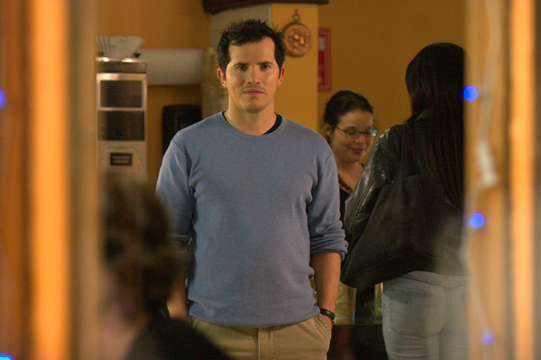 It
mentions in the press notes that in the first draft the story ended with
them all going to jail. Why do you think it is important to the story
for them to get away with it – at least legally, though there are
obviously going to be repercussions in all their lives?
It
mentions in the press notes that in the first draft the story ended with
them all going to jail. Why do you think it is important to the story
for them to get away with it – at least legally, though there are
obviously going to be repercussions in all their lives?
David Ross:
Because I think
that them having to live with it can be just as hard – if not harder.
Look, how many people go to prison for doing something terrible and
then… and I’m not even talking about people who may be mentally ill or
whatnot, I’m talking about people who are intelligent and can make
decisions… they go away for a little while, they get out and they just
do something else again, because they’re like, “Well, I’ve paid my debt.
That’s it, I’m gonna continue to do wrong by others.”
It drives me nuts when you see somebody get in trouble and
they go, “Oh, I’m so sorry!” You were doing it up until the
moment you got caught. I don’t think these two characters think they got
away with anything. They just didn’t need the law to slap them on the
hand.
So talk about that,
how you guys felt about the way it ended… Did you think of other
options? How did you two perceive the changes?
Katherine Waterston:
It’s interesting, because we talked so much about all the scenes
together, but I don’t actually feel like we really discussed that…
John Leguizamo:
Yeah, we
didn’t talk about that.
Katherine Waterston:
I think that was probably intentional, because we were separating
ourselves from one another. But, I was very happy with the script.
John Leguizamo:
I think we
liked it and that’s why we didn’t talk about it.
Katherine Waterston:
I like the fact that you don’t get any answers about either of them. I
even love that you don’t get to see them… you know they’re off in their
places. You’re talking about those films where you see someone suddenly
understand what it all meant.
David Ross:
Yeah, the epiphany.
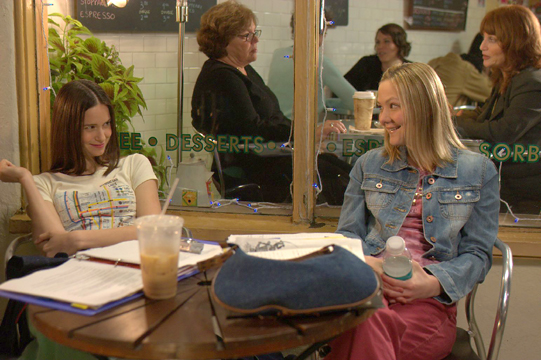 Katherine
Waterston:
Exactly. I love that – I think with both of us, I don’t want to speak
for you – but I feel like with both characters we didn’t have that
moment onscreen. I don’t believe that it happened. It’s just like the
flip of what I was talking about, with the teenager suddenly becoming an
adult. It doesn’t happen in one moment. It’s just because we have two
hours in a film that that happens so quickly. (chuckles)
Katherine
Waterston:
Exactly. I love that – I think with both of us, I don’t want to speak
for you – but I feel like with both characters we didn’t have that
moment onscreen. I don’t believe that it happened. It’s just like the
flip of what I was talking about, with the teenager suddenly becoming an
adult. It doesn’t happen in one moment. It’s just because we have two
hours in a film that that happens so quickly. (chuckles)
John Leguizamo:
What’s cool towards the end because Michael and Shirley started out a
little bit ineffectual in their lives. Here at the end, they are back at
that same place where they can’t motivate something. They can’t really
articulate it. They are back into this world where they can’t make
decisions. I thought that was great. That’s who they essentially really
are. They are back to that again. No matter what happened with the two
of them, they are still basically these two people who feel a lot but
don’t let it out. They are like most of us. We go through life
experiencing a lot, [but] there are only a few times that you really are
heroic or villainous. The rest of the time, “Oh, I don’t know… What do I
do?”
One thing I thought
was interesting was that you just didn’t make bad choices, but you were
really dumb about your best friends. Her best friend is way scarier that
we thought. And his best friends are really capable of violence that I
don’t think you saw either. They were kind of dumb about a lot of
things.
John Leguizamo:
That’s what I like about these characters. They were like average-aroonies.
They weren’t the starters. They weren’t the best at everything. Michael
was sort of the middle of the road kind of guy.
Katherine Waterston:
But, also, I think it’s sometimes common to have friends that you can
live vicariously through – that make you feel better about who you are,
because they’re worse than you. They’re really fucked up.
David Ross:
Especially
because both of these characters have that need to break out and do
something else, so they both need someone else like that…
Katherine Waterston:
… to get them to act that way. We didn’t do it.
What has the reaction
been to the morally ambiguous ending?
John Leguizamo:
You didn’t have anyone walk out, did you?
David Ross:
Hmmm… I’m sure we have…
Katherine Waterston:
Don’t say that! (laughs) If they did keep it quiet.
David Ross:
I do want to leave it very open for the audience so that they can sort
of take what they will from it. There’s a part of me that feels like,
well, who the hell am I to tell people how they should feel about this
or how they should behave. We wanted to keep the story very simple and
say here’s an example of what happens when maybe people try to… you know
first they try to get out of this rut. They try to live a more
fulfilling life, but sometimes they take that too far or they go about
it in a way that is ultimately harmful and unhealthy. But even that,
once again, goes back to this idea that you could say that they got away
with it. You really could. I think that some of the other people
involved with this – you could say that Melissa, Shirley’s friend, there
was at one point a moment in the script where she said “You got away
with it.” Nothing happened. Nobody’s pregnant. Nobody got herpes – at
least as far as we know at this point. Nobody went to jail.